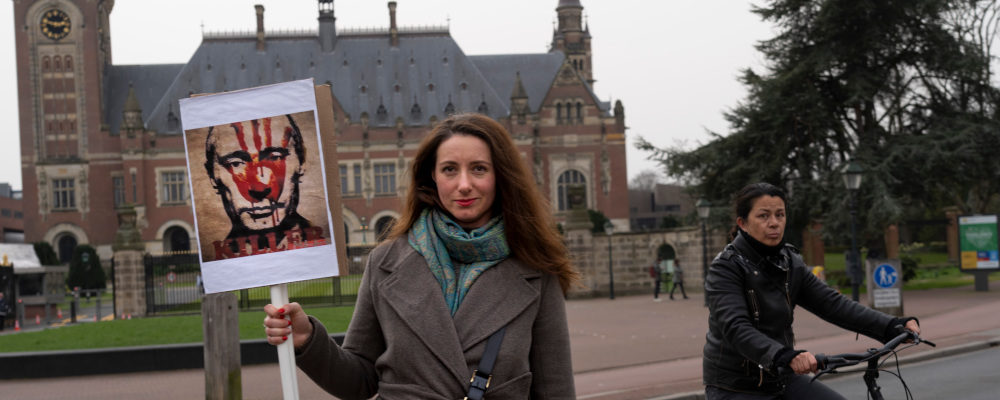Day after day, the horror of Russia’s illegal war in Ukraine is being revealed to the world. As the Russian military retreats from the cities and towns they occupied for the past several weeks, early reports reveal evidence that war crimes have been, and may continue to be, committed.1“Horrific photos of civilian corpses — some with their hands tied behind their backs — clearly show the brutality of the Russian occupation in the areas near Kyiv, Chernihiv, and Kharkiv. Russia agreed to withdraw forces in the north of Ukraine during ongoing negotiations to end the fighting, while more than 2,000 incidents of violations of the laws and customs of war have been reported to Ukrainian Prosecutor General Iryna Venediktova’s office thus far.” https://www.vox.com/2022/4/3/23009048/russian-troops-retreat-in-ukraine-civilian-deaths-discovered And so international law—the law that governs relations between countries and applies to the prosecution of war crimes and crimes against humanity—is going to work.
In pursuing this depraved war of aggression, Russian President Vladimir Putin has aroused levels of cooperation and solidarity amongst the international community unlike anything seen in recent decades. On March 2nd, in an emergency special session, the UN General Assembly voted 141 to 5 (with 35 abstentions) to condemn the invasion and reaffirm Ukraine’s existing borders.2UN resolution against Ukraine invasion: Full text Subsequent resolutions demanded that Russia allow civilians safe passage through Ukraine and suspended Russia from the UN Human Rights Council.3UN General Assembly votes to suspend Russia from the Human Rights Council And Ukraine’s allies have imposed unprecedented sanctions on Russian banks, businesses, political leaders, and oligarchs that appear to be seriously damaging the Russian economy and, by extension, its war effort.4What sanctions are being imposed on Russia over Ukraine invasion?
For its part, Ukraine has sought redress through several channels. It is seeking a declaration by the International Court of Justice that one of Russia’s pretexts for invading—its claim that Ukraine is committing “genocide” against Russian speakers in the Ukrainian Donbas region—is bogus; at the International Criminal Court, the Chief Prosecutor announced that his office would begin investigations into alleged war crimes—one of the first instances of an international organization documenting and compiling evidence regarding war crimes in real-time; and, at Ukraine’s request, the UN established a Commission of Inquiry to investigate any human rights abuses and violations of international humanitarian law committed by Russia.
All that is nice, you might say, but what will actually be achieved by all this international law activity?
International law has historically been hindered by two inherent and related defects: first, the international community is made up of states that are presumed to be sovereign. Despite the ways in which globalization has remade and shrunk our world, many would argue that a “global society,” in the legal sense, does not exist. There is no “community” of nations; there are just sovereign states and, above them, a state of anarchy. This view has been supported by the reality that a state that does not wish to abide by UN resolutions, participate in International Criminal Court proceedings, or even meet its obligations under treaties it has signed and ratified simply does not have to do so.
Second, international law suffers from a lack of enforcement. Because there is no world police, the international community cannot directly enforce international treaties, UN Security Council resolutions, International Court of Justice decisions, and other international legal norms. And, unless an individual accused of war crimes surrenders themself or is otherwise captured, they generally evade prosecution.
Instead, the international community engages in what international law scholars have termed “outcasting”—denying the offending state the benefits of global cooperation and integration.5International Law Goes to War in Ukraine But such measures have historically done little to curb undesirable state behaviour and have, in many tragic instances, been too late to prevent war crimes and crimes against humanity.
But with regard to Ukraine, international law has not been impotent at all. Crucially, the UN resolutions condemning Russia have given democratic legitimacy to the sanctions imposed by Ukraine’s allies so that the sanctions are not being imposed merely because the United States, Canada, and European allies personally dislike what Russia is doing (though of course they do); rather, they reflect the will of the international community as a whole. (Contrast this with, for instance, the Iraq War, where the international community specifically rejected the need for a brute force invasion and which is considered by many to be an “illegal war”).
And Ukraine’s willingness to fight the legal battle as well as the military one—the proceedings at the ICJ, for instance—is achieving two things: first, it stops Russia from asserting any viable claim that its invasion was necessary or permitted under international law. Second, and perhaps more importantly for the future of international law, Ukraine is setting a strong example that, even in the midst of war, states should still seek to resolve international disputes through civilized, legal means.
To be clear, it is unlikely that fighting in Ukraine will stop anytime soon. Russia has made clear that it intends to continue fighting in certain parts of the country and will continue to support separatist militias in the Donbas. But that does not mean that international law has altogether failed Ukraine.
If the international community’s response to this war of aggression is successful in outcasting Russia and halting its advance in Ukraine (as tentatively appears to be the case), minimizing innocent civilian casualties and managing the resultant refugee crisis, and documenting war crimes as they happen, then the international community—and international law itself—will have done something great.
Ultimately, the rule of law, whether international or domestic, is aimed at protecting peace and providing justice. If international law can help bring peace to Ukraine and hold accountable the Russian actors (politicians, oligarchs, captured soldiers, or otherwise) who orchestrated this illegal war, then it will have served its purpose and served the people of Ukraine.
Hopefully, this is the beginning of a new chapter for international law. The people of Syria and Yemen—to name just a couple of the communities who have been suffering at the hands of aggressive foreign powers far longer than Ukrainians—need international law on their side, too.




